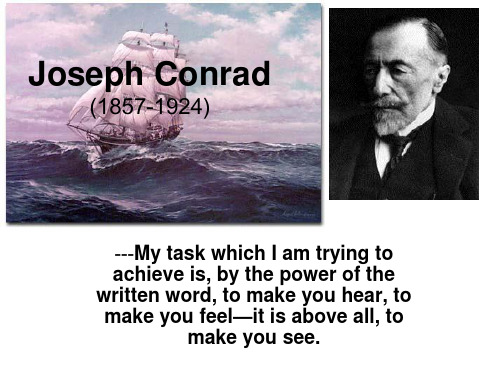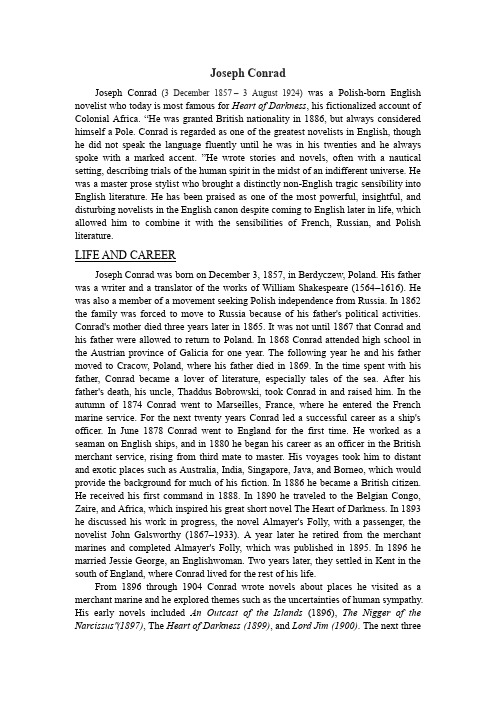Joseph_Conrad 约瑟夫康拉德 英文介绍 详细版
- 格式:ppt
- 大小:1.54 MB
- 文档页数:23




Joseph ConradJoseph Conrad(3 December 1857 –3 August 1924)was a Polish-born English novelist who today is most famous for Heart of Darkness, his fictionalized account of Colonial Africa. “He was granted British nationality in 1886, but always considered himself a Pole. Conrad is regarded as one of the greatest novelists in English, though he did not speak the language fluently until he was in his twenties and he always spoke with a marked accent. ”He wrote stories and novels, often with a nautical setting, describing trials of the human spirit in the midst of an indifferent universe. He was a master prose stylist who brought a distinctly non-English tragic sensibility into English literature. He has been praised as one of the most powerful, insightful, and disturbing novelists in the English canon despite coming to English later in life, which allowed him to combine it with the sensibilities of French, Russian, and Polish literature.LIFE AND CAREERJoseph Conrad was born on December 3, 1857, in Berdyczew, Poland. His father was a writer and a translator of the works of William Shakespeare (1564–1616). He was also a member of a movement seeking Polish independence from Russia. In 1862 the family was forced to move to Russia because of his father's political activities. Conrad's mother died three years later in 1865. It was not until 1867 that Conrad and his father were allowed to return to Poland. In 1868 Conrad attended high school in the Austrian province of Galicia for one year. The following year he and his father moved to Cracow, Poland, where his father died in 1869. In the time spent with his father, Conrad became a lover of literature, especially tales of the sea. After his father's death, his uncle, Thaddus Bobrowski, took Conrad in and raised him. In the autumn of 1874 Conrad went to Marseilles, France, where he entered the French marine service. For the next twenty years Conrad led a successful career as a ship's officer. In June 1878 Conrad went to England for the first time. He worked as a seaman on English ships, and in 1880 he began his career as an officer in the British merchant service, rising from third mate to master. His voyages took him to distant and exotic places such as Australia, India, Singapore, Java, and Borneo, which would provide the background for much of his fiction. In 1886 he became a British citizen. He received his first command in 1888. In 1890 he traveled to the Belgian Congo, Zaire, and Africa, which inspired his great short novel The Heart of Darkness. In 1893 he discussed his work in progress, the novel Almayer's Folly, with a passenger, the novelist John Galsworthy (1867–1933). A year later he retired from the merchant marines and completed Almayer's Folly, which was published in 1895. In 1896 he married Jessie George, an Englishwoman. Two years later, they settled in Kent in the south of England, where Conrad lived for the rest of his life.From 1896 through 1904 Conrad wrote novels about places he visited as a merchant marine and he explored themes such as the uncertainties of human sympathy. His early novels included An Outcast of the Islands(1896), The Nigger of the "Narcissus" (1897), The Heart of Darkness (1899), and Lord Jim (1900). The nextthree novels reflected Conrad's political side, including Nostromo (1904), The Secret Agent (1907), Under Western Eyes (1911). Although Conrad's last novels, The Shadow Line (1917) and The Rover (1923), were written as a farewell, he received many honors. In 1923 he visited the United States to great fanfare. The year after, he declined an offer of knighthood in England.On August 3, 1924, Conrad died of a heart attack and was buried at Canterbury, England. His gravestone bears these lines from Edmund Spenser (1552–1599): "Sleep after toyle, port after stormie seas,/ Ease after warre, death after life, does greatly please."Joseph Conrad began writing in 1889. In total, he wrote 13 novels, 28 short stories and 2 memories.Almayer’s Folly(1895) was Conrad‟s first published novel. It is set towards the end of the 19th century in the Malay Archipelago and deals with the conflicts between European colonialism and the native population. Dreams of easy wealth drive the Dutch trader Kaspar Almayer into grandiose schemes which come to nothing. His mixed-race wife despises him and is having an affair with a local native war lord. He completely misjudges the turmoil of events in which he becomes enmeshed and eventually descends into opium addiction and self-destruction. The novel contains many stereotypes of nineteenth century imperialist ideology, but its events are related in a manner which would lead to the development of literary modernism in the 20th century.Lord Jim (1900) is the earliest of Conrad‟s big and serious novels, and it explores one of his favourite subjects –cowardice and moral redemption. Jim is a ship‟s captain who in youthful ignorance commits the worst offence – abandoning his ship. He spends the remainder of his adult life in shameful obscurity in the South Seas, trying to re-build his confidence and his character. What makes the novel fascinating is not only the tragic but redemptive outcome, but the manner in which it is told. The narrator recounts the events in a time scheme which shifts between past and present in an amazingly complex manner. This is one of the features which makes Conrad considered one of the fathers of twentieth century modernism.Heart of Darkness(1902) is a tightly controlled novella which has assumed classic status as an account of the process of Imperialism. It documents the search for a mysterious Kurtz, who has …gone too far‟ in his exploitation of Africans in the ivory trade. The reader is plunged deeper and deeper into the …horrors‟ of what happen ed when Europeans invaded the continent. This might well go down in literary history as Conrad‟s finest and most insightful achievement, and it is based on his own experiences as a sea captain.Nostromo(1904) is Conrad‟s …big‟ political novel – into which he packs all of his major subjects and themes. It is set in the imaginary Latin-American country of Costaguana –and features a stolen hoard of silver, desperate acts of courage, characters trembling on the brink of moral panic. The political background encompasses nationalist revolution and the Imperialism of foreign intervention. Silveris the pivot of the whole story – revealing the courage of some and the corruption and destruction of others. Conrad‟s narration is as usual complex and oblique. He begin s half way through the events of the revolution, and proceeds by way of flashbacks and glimpses into the future.1.Much of his writing bears a profound philosophical quality, exploring the depthsof psychology, morality, the creative impulse, and other pillars of existence.2.Most of his novels and stories have a seaboard setting.3.While some of his works have a strain of Romanticism, he is viewed as aprecursor of Modernism literature. His narrative style and anti-heroic characters have influenced many authors.4.Conrad concludes with a beautiful metaphor that captures the essence of art asboth construct and contextReferences1./Co-Da/Conrad-Joseph.html2./2009/09/17/joseph-conrad-his-greatest-works/3./wiki/Joseph_Conrad。


诗人康拉德是哪个国家的康拉德,JosephJózefTeodorConradKorzeniowski波兰裔英国作家。
1857年12月3日生于一个诗人家庭,1924年8月3日卒于英国坎特伯雷。
下面是店铺为你搜集康拉德是哪个国家的相关内容,希望对你有帮助!康拉德简介康拉德全名约瑟夫·特奥多·康拉德·科尔泽尼奥夫斯基,1857年12月3日出生在波兰,但在他的一生中约有二十年的时光是在海上度过的。
正是因为在海上漂泊的这二十几年,使得他积累了丰富的航海经验,同时积累的还有写作素材。
康德拉二十多年的航海经历使得他被称为航海家,但是除了这一身份外,他还是一名作家,最擅长写海洋冒险类的小说,因此也被人们称为海洋小说大师。
康拉德是波兰上流社会家庭中的小孩,因为不满沙俄对波兰的统治,在十七岁的时候逃离到了法国,从此开始了自己的航海生涯。
在康拉德的二十多年的航海生涯中,有十六年在英国的商船上工作。
1886年的时候,康拉德加入了英国国籍,并且开始担任船长。
1890年由他驾驶的船只行驶到了非洲的刚果。
1893年是康拉德作为大副最后一次航海。
这次航海他最大的收获是交到了一位文坛好友。
1894年康拉德结束了他的漂流生活,开始定居欲陆地。
两年后因为身体的原因,他正式放弃了航海生活,转而开始文学创作,一年后他的首部代表作品《水仙号上的黑水手》正式完成。
在此之后,他继续坚持文学创作,直到六十七岁逝世为止,他给世人留下了大量的优秀作品和航海经验。
以上便是约瑟夫康拉德简介的主要内容。
约瑟夫康拉德写作特点约瑟夫康拉德是英国现代主义小说的先驱,约瑟夫康拉德写作特点第一条就是具有现代主义色彩。
在这一方面他继承了亨利·詹姆斯的英语小说改革,为维多利亚小说与现代派作家提供了一个过度。
约瑟夫康拉德写作特点的第二条是印象主义及悲剧性,其作品不仅以印象主义著称,同时更以其作品所具备的悲剧性给人们的心灵造成震撼。